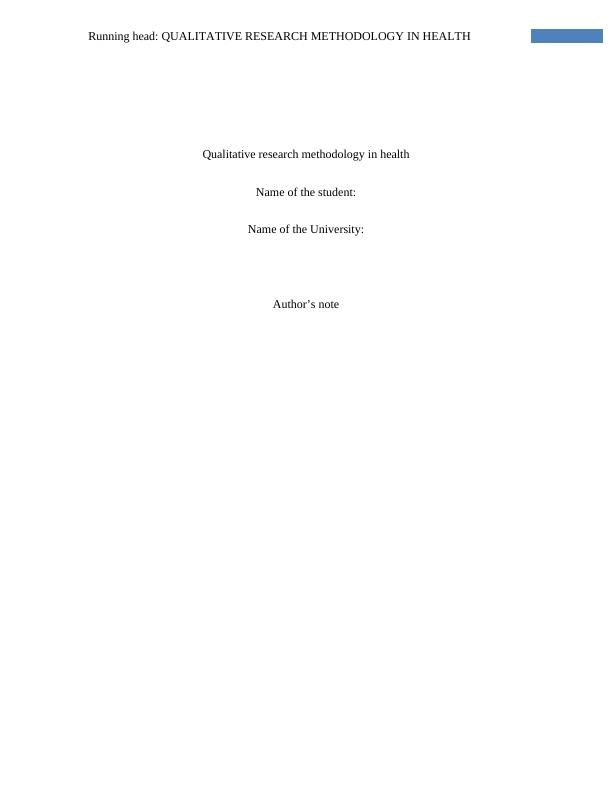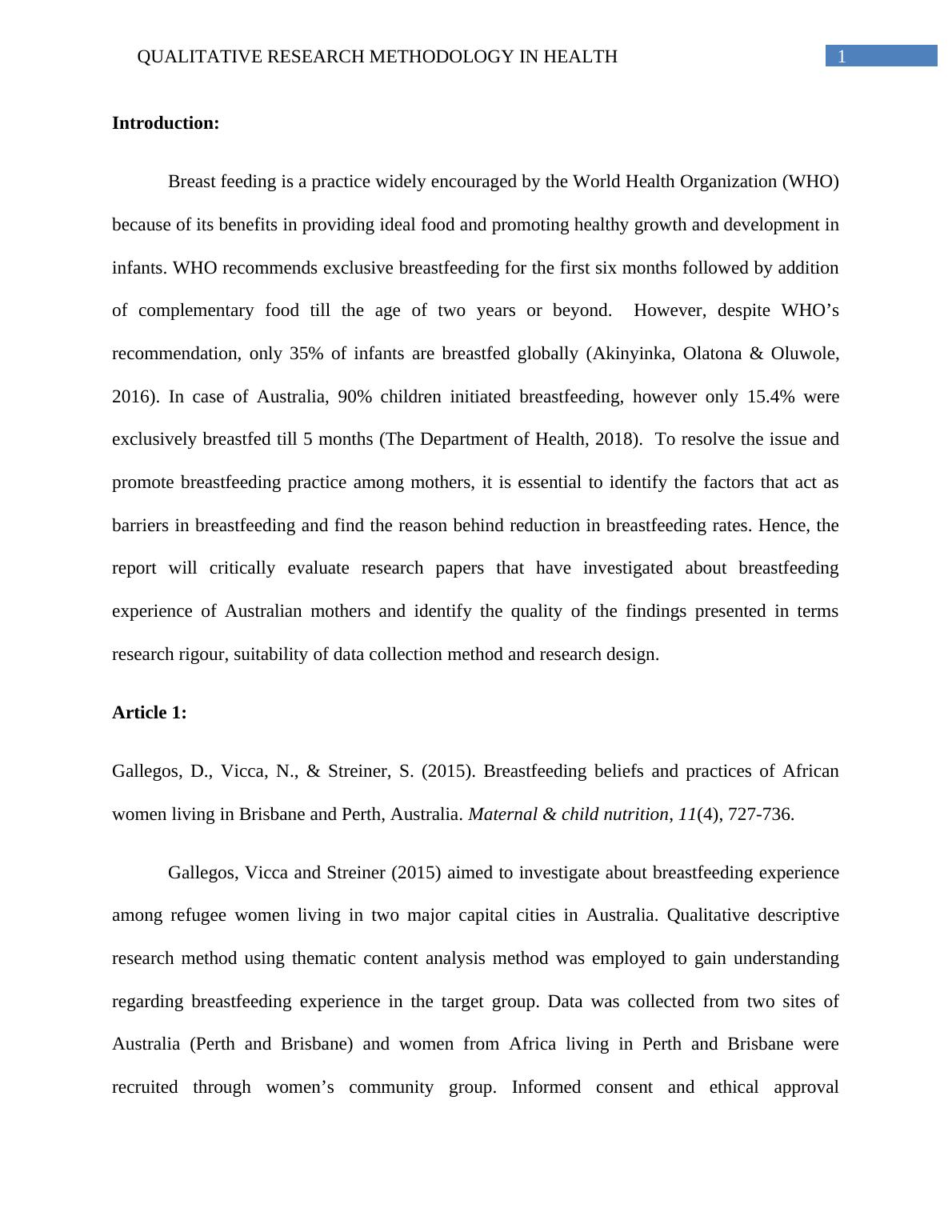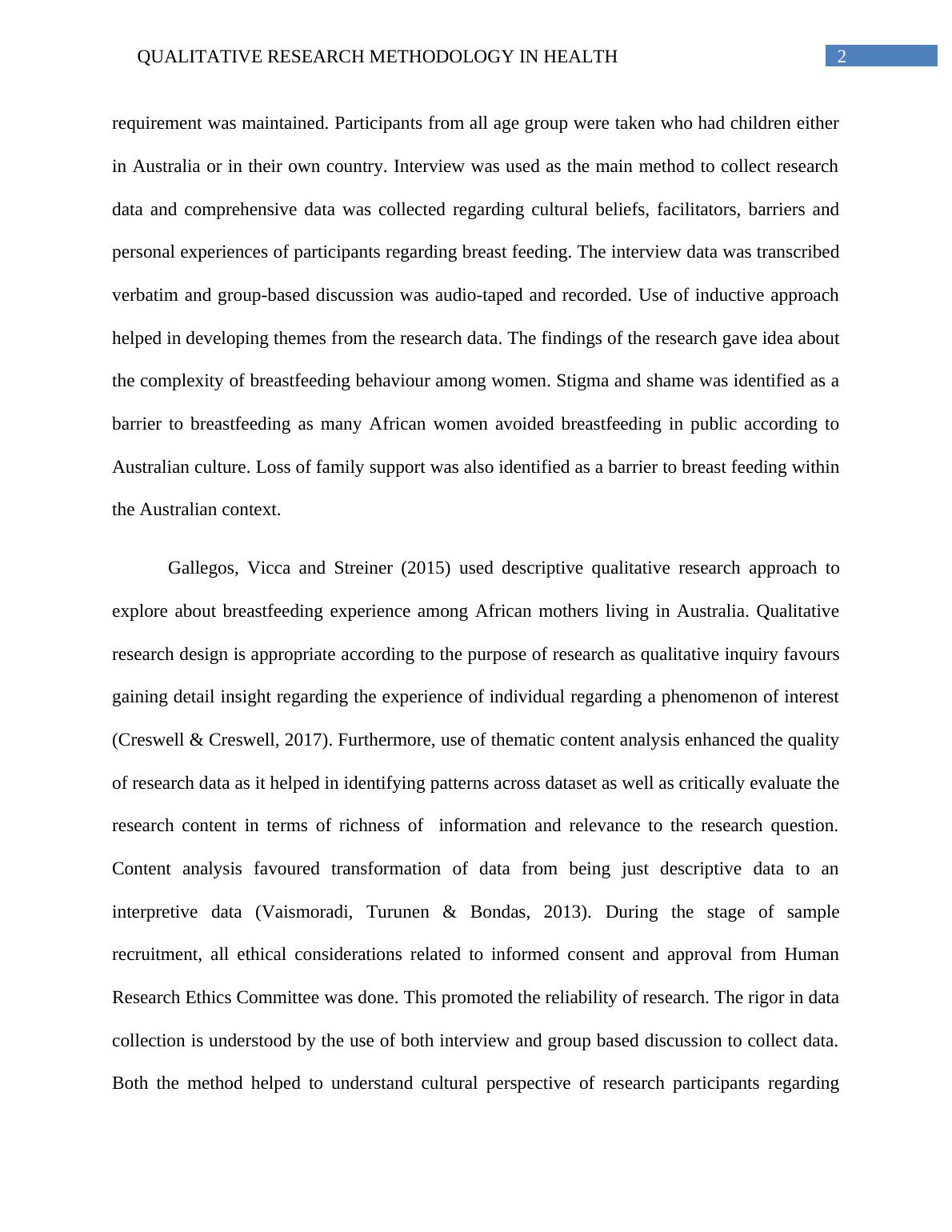Qualitative Research Methodology in Health
Added on 2023-06-07
9 Pages2465 Words425 Views
Running head: QUALITATIVE RESEARCH METHODOLOGY IN HEALTH
Qualitative research methodology in health
Name of the student:
Name of the University:
Author’s note
Qualitative research methodology in health
Name of the student:
Name of the University:
Author’s note

1QUALITATIVE RESEARCH METHODOLOGY IN HEALTH
Introduction:
Breast feeding is a practice widely encouraged by the World Health Organization (WHO)
because of its benefits in providing ideal food and promoting healthy growth and development in
infants. WHO recommends exclusive breastfeeding for the first six months followed by addition
of complementary food till the age of two years or beyond. However, despite WHO’s
recommendation, only 35% of infants are breastfed globally (Akinyinka, Olatona & Oluwole,
2016). In case of Australia, 90% children initiated breastfeeding, however only 15.4% were
exclusively breastfed till 5 months (The Department of Health, 2018). To resolve the issue and
promote breastfeeding practice among mothers, it is essential to identify the factors that act as
barriers in breastfeeding and find the reason behind reduction in breastfeeding rates. Hence, the
report will critically evaluate research papers that have investigated about breastfeeding
experience of Australian mothers and identify the quality of the findings presented in terms
research rigour, suitability of data collection method and research design.
Article 1:
Gallegos, D., Vicca, N., & Streiner, S. (2015). Breastfeeding beliefs and practices of African
women living in Brisbane and Perth, Australia. Maternal & child nutrition, 11(4), 727-736.
Gallegos, Vicca and Streiner (2015) aimed to investigate about breastfeeding experience
among refugee women living in two major capital cities in Australia. Qualitative descriptive
research method using thematic content analysis method was employed to gain understanding
regarding breastfeeding experience in the target group. Data was collected from two sites of
Australia (Perth and Brisbane) and women from Africa living in Perth and Brisbane were
recruited through women’s community group. Informed consent and ethical approval
Introduction:
Breast feeding is a practice widely encouraged by the World Health Organization (WHO)
because of its benefits in providing ideal food and promoting healthy growth and development in
infants. WHO recommends exclusive breastfeeding for the first six months followed by addition
of complementary food till the age of two years or beyond. However, despite WHO’s
recommendation, only 35% of infants are breastfed globally (Akinyinka, Olatona & Oluwole,
2016). In case of Australia, 90% children initiated breastfeeding, however only 15.4% were
exclusively breastfed till 5 months (The Department of Health, 2018). To resolve the issue and
promote breastfeeding practice among mothers, it is essential to identify the factors that act as
barriers in breastfeeding and find the reason behind reduction in breastfeeding rates. Hence, the
report will critically evaluate research papers that have investigated about breastfeeding
experience of Australian mothers and identify the quality of the findings presented in terms
research rigour, suitability of data collection method and research design.
Article 1:
Gallegos, D., Vicca, N., & Streiner, S. (2015). Breastfeeding beliefs and practices of African
women living in Brisbane and Perth, Australia. Maternal & child nutrition, 11(4), 727-736.
Gallegos, Vicca and Streiner (2015) aimed to investigate about breastfeeding experience
among refugee women living in two major capital cities in Australia. Qualitative descriptive
research method using thematic content analysis method was employed to gain understanding
regarding breastfeeding experience in the target group. Data was collected from two sites of
Australia (Perth and Brisbane) and women from Africa living in Perth and Brisbane were
recruited through women’s community group. Informed consent and ethical approval

2QUALITATIVE RESEARCH METHODOLOGY IN HEALTH
requirement was maintained. Participants from all age group were taken who had children either
in Australia or in their own country. Interview was used as the main method to collect research
data and comprehensive data was collected regarding cultural beliefs, facilitators, barriers and
personal experiences of participants regarding breast feeding. The interview data was transcribed
verbatim and group-based discussion was audio-taped and recorded. Use of inductive approach
helped in developing themes from the research data. The findings of the research gave idea about
the complexity of breastfeeding behaviour among women. Stigma and shame was identified as a
barrier to breastfeeding as many African women avoided breastfeeding in public according to
Australian culture. Loss of family support was also identified as a barrier to breast feeding within
the Australian context.
Gallegos, Vicca and Streiner (2015) used descriptive qualitative research approach to
explore about breastfeeding experience among African mothers living in Australia. Qualitative
research design is appropriate according to the purpose of research as qualitative inquiry favours
gaining detail insight regarding the experience of individual regarding a phenomenon of interest
(Creswell & Creswell, 2017). Furthermore, use of thematic content analysis enhanced the quality
of research data as it helped in identifying patterns across dataset as well as critically evaluate the
research content in terms of richness of information and relevance to the research question.
Content analysis favoured transformation of data from being just descriptive data to an
interpretive data (Vaismoradi, Turunen & Bondas, 2013). During the stage of sample
recruitment, all ethical considerations related to informed consent and approval from Human
Research Ethics Committee was done. This promoted the reliability of research. The rigor in data
collection is understood by the use of both interview and group based discussion to collect data.
Both the method helped to understand cultural perspective of research participants regarding
requirement was maintained. Participants from all age group were taken who had children either
in Australia or in their own country. Interview was used as the main method to collect research
data and comprehensive data was collected regarding cultural beliefs, facilitators, barriers and
personal experiences of participants regarding breast feeding. The interview data was transcribed
verbatim and group-based discussion was audio-taped and recorded. Use of inductive approach
helped in developing themes from the research data. The findings of the research gave idea about
the complexity of breastfeeding behaviour among women. Stigma and shame was identified as a
barrier to breastfeeding as many African women avoided breastfeeding in public according to
Australian culture. Loss of family support was also identified as a barrier to breast feeding within
the Australian context.
Gallegos, Vicca and Streiner (2015) used descriptive qualitative research approach to
explore about breastfeeding experience among African mothers living in Australia. Qualitative
research design is appropriate according to the purpose of research as qualitative inquiry favours
gaining detail insight regarding the experience of individual regarding a phenomenon of interest
(Creswell & Creswell, 2017). Furthermore, use of thematic content analysis enhanced the quality
of research data as it helped in identifying patterns across dataset as well as critically evaluate the
research content in terms of richness of information and relevance to the research question.
Content analysis favoured transformation of data from being just descriptive data to an
interpretive data (Vaismoradi, Turunen & Bondas, 2013). During the stage of sample
recruitment, all ethical considerations related to informed consent and approval from Human
Research Ethics Committee was done. This promoted the reliability of research. The rigor in data
collection is understood by the use of both interview and group based discussion to collect data.
Both the method helped to understand cultural perspective of research participants regarding

End of preview
Want to access all the pages? Upload your documents or become a member.
Related Documents
Pre-Exam Research Article Worksheet 1 – Exam 2 PC718.lg...
|4
|1242
|21
Nursing Assignment on Breastfeedinglg...
|7
|1712
|1441
Impact of Government's Strategy for Promoting Breastfeeding in the UKlg...
|25
|4816
|61
Knowledge, Attitude and Practices on Exclusive Breastfeeding in Lactating Mothers of Infants Aged 0-6 Months in Addu Citylg...
|15
|5502
|444
